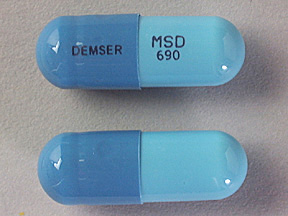Demser Disease Interactions
There are 3 disease interactions with Demser (metyrosine).
Metyrosine (applies to Demser) extrapyramidal symptoms
Moderate Potential Hazard, Moderate plausibility. Applicable conditions: Parkinsonism
Extrapyramidal symptoms (EPS) have occurred in approximately 10% of patients receiving metyrosine. EPS include drooling, speech difficulty, and tremor. Trismus and parkinsonian syndrome have been reported. Therapy with metyrosine should be administered cautiously in patients with or predisposition to EPS or Parkinson's disease. Dosage reduction or discontinuation of metyrosine may be necessary.
Metyrosine (applies to Demser) psychoses and emotional disturbances
Moderate Potential Hazard, Low plausibility. Applicable conditions: Psychosis
Anxiety, excitability, and psychic disturbances such as hallucinations, disorientation/confusion, emotional instability, and depression have occurred in patients receiving metyrosine. Therapy with metyrosine should be administered cautiously in patients with psychiatric and/or emotional disorders. Dosage reduction may be appropriate. Clinical monitoring of emotional and psychiatric status is recommended.
Metyrosine (applies to Demser) renal dysfunction
Moderate Potential Hazard, Moderate plausibility.
Metyrosine is primarily eliminated by the kidney. The serum concentration of metyrosine may be increased in patients with renal impairment. Therapy with metyrosine should be administered cautiously in patient with compromised renal function. Clinical monitoring of renal function is recommended.
Switch to professional interaction data
Demser drug interactions
There are 255 drug interactions with Demser (metyrosine).
Demser alcohol/food interactions
There is 1 alcohol/food interaction with Demser (metyrosine).
More about Demser (metyrosine)
- Demser consumer information
- Check interactions
- Compare alternatives
- Pricing & coupons
- Drug images
- Side effects
- Dosage information
- Generic availability
- Drug class: miscellaneous cardiovascular agents
- En español
Related treatment guides
Drug Interaction Classification
| Highly clinically significant. Avoid combinations; the risk of the interaction outweighs the benefit. | |
| Moderately clinically significant. Usually avoid combinations; use it only under special circumstances. | |
| Minimally clinically significant. Minimize risk; assess risk and consider an alternative drug, take steps to circumvent the interaction risk and/or institute a monitoring plan. | |
| No interaction information available. |
See also:
Further information
Always consult your healthcare provider to ensure the information displayed on this page applies to your personal circumstances.


